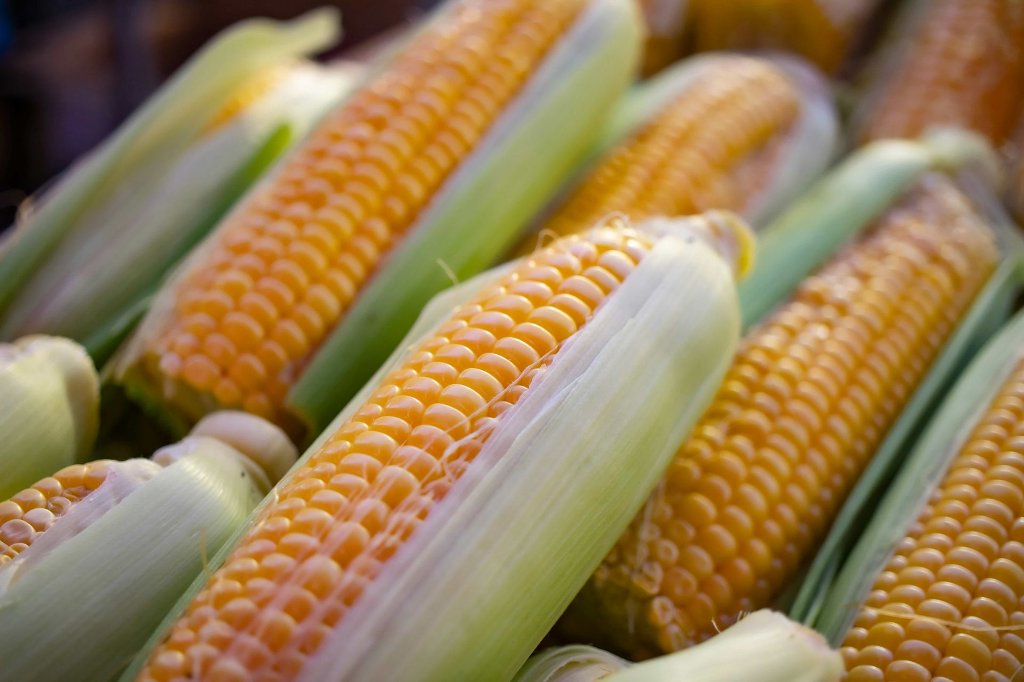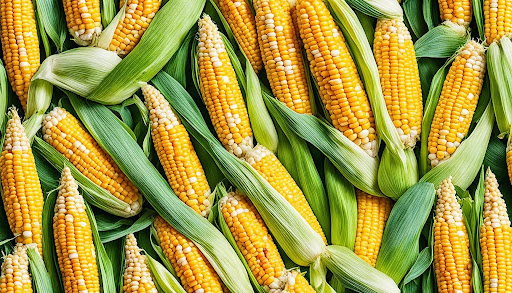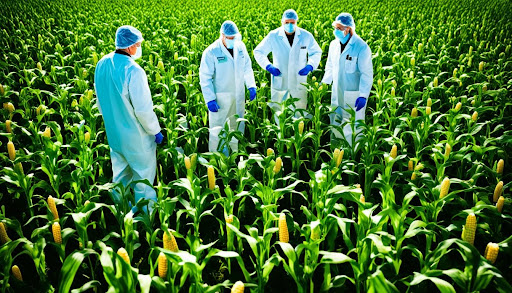Corn's Nutritional Value: Myths vs. Facts

Welcome to our comprehensive exploration of corn's nutritional value. Corn has been a staple in many cultures for centuries, but there are numerous myths surrounding its nutrition. Are you curious to uncover the truth behind these myths and discover the facts about corn's nutritional worth? Look no further! In this article, we will delve into the nutrient content, health benefits, and debunk common misconceptions about corn. So, let's separate fact from fiction and gain a deeper understanding of the true nutritional value of corn.

Key Takeaways:
- There are several myths surrounding the nutritional value of corn.
- In this article, we will explore the truth behind these myths and uncover the facts about corn's nutrition.
- We will discuss the nutrient content, health benefits, and debunk common misconceptions about corn.
- Corn has a rich nutritional profile, including essential vitamins, minerals, and fiber.
- Contrary to popular belief, corn is not just a filler but offers a range of hidden health benefits.
Uncovering the Truth: Does Corn Have Nutritional Value?
In this section, we will explore the nutrient content of corn and uncover the truth behind its nutritional value. Corn, also known as maize, is a popular and versatile grain consumed worldwide. But what exactly does it offer in terms of nutrition? Let's dive into the details and discover the nutritional benefits of this beloved food.
The Lowdown on Corn's Nutrient Content
Corn is a good and essential source of nutrients that contribute to overall health. It contains a range of vitamins and minerals, including:
- Vitamin C
- Vitamin B6
- Folate
- Magnesium
- Phosphorus
These nutrients play important roles in the body, supporting immune function, energy production, and bone health.
Corn's Macronutrients: A Closer Look
Macronutrients are the nutrients needed by the body in larger quantities, and corn provides a good balance of these macronutrients. Let's break down the macronutrient profile of corn:
| Nutrient | Amount per 100g |
Carbohydrates | 74g |
Protein | 9g |
| Fat | 4g |
Corn is primarily made up of carbohydrates, making it a good source of energy. Additionally, it contains a moderate amount of protein and a small amount of fat.
Separating the Grain from the Chaff: What's in Your Cob?
When we talk about corn, we are often referring to the edible part of the corn plant, which is the kernel. However, the corn cob itself also contains nutrients that contribute to corn's overall nutritional value. Let's take a closer look at what's in your corn cob:
The corn cob provides dietary fiber, which is important for digestive health and maintaining a healthy weight. It also contains antioxidants that help protect the body against oxidative stress and reduce the risk of certain chronic diseases.
Now that we have uncovered the truth about corn's nutritional value, let's move on to the next section where we will debunk common myths surrounding corn and highlight its many health benefits.
Debunking Corn Myths: It's Not Just a Filler
Many people believe that corn is just a filler with little nutritional value. In this section, we will debunk this myth by exploring the various health benefits that corn provides. We will delve into the essential nutrients found in corn that contribute to a healthy diet. Additionally, we will address concerns about the digestibility of corn and provide evidence to show that it can be easily digested by the body.
Rich in Essential Nutrients: Corn's Undeniable Benefits
Corn is a nutrient-dense food that offers a variety of health benefits. Contrary to the myth that corn is just a filler, it contains valuable vitamins and minerals that support overall well-being. Corn is a good source of folate, a B-vitamin that is essential for cell growth and development. It also provides vitamin C, which boosts the immune system and supports collagen production.
Furthermore, corn is rich in dietary fiber, which aids in digestion and helps maintain a healthy weight. The fiber in corn promotes feelings of fullness, reducing the risk of overeating. Additionally, corn contains antioxidants such as lutein and zeaxanthin, which are beneficial for eye health and may reduce the risk of age-related macular degeneration.
So, next time someone dismisses corn as just a filler, remember that it packs a punch when it comes to essential nutrients and health benefits.
Busting the Myth: The Digestibility of Corn
Another myth surrounding corn is its digestibility. Some people believe that corn is difficult to digest and can cause digestive discomfort. However, this is not entirely true.
Corn is indeed rich in dietary fiber, which can promote healthy digestion. While some people may experience gas or bloating after consuming corn, this is generally due to individual variations in digestion and not the digestibility of corn itself.
Moreover, the nutritional components of corn, such as proteins and carbohydrates, can be effectively broken down and absorbed by the body. Proper cooking and chewing can also enhance the digestibility of corn, making it a valuable addition to a well-balanced diet.
So, don't let the myth of corn's digestibility deter you from enjoying its nutritional benefits. When prepared and consumed properly, corn is a wholesome and easily digestible food.
The Hidden Health Benefits of Corn
Corn offers a range of hidden health benefits that are often overlooked. In this section, we will explore how corn can contribute to cardiovascular health, aid in weight management, and support gut health and regularity.
Corn and Cardiovascular Health: A Heart-Healthy Choice
When it comes to cardiovascular health, corn can play a significant role. Studies have shown that the consumption of corn and its derivatives can help lower cholesterol levels and reduce the risk of heart disease. The high fiber content in corn can help regulate cholesterol levels by binding to cholesterol in the digestive system and eliminating it from the body. Additionally, corn contains antioxidants and phytochemicals that contribute to heart health by reducing inflammation and oxidative stress.
How Corn's Nutrients Aid in Weight Management
If you're looking to manage your weight, incorporating corn into your diet can be a wise choice. Corn is low in fat and a good source of fiber, which can help you feel fuller for longer and curb cravings. The fiber in corn also promotes healthy digestion and prevents constipation, further supporting weight management efforts. Additionally, corn contains complex carbohydrates that provide sustained energy, helping you stay active and maintain a healthy body weight.
Corn's Contributions to Gut Health and Regularity
Gut health is essential for overall well-being, and corn can contribute to a healthy digestive system. The fiber in corn acts as a prebiotic, nourishing the beneficial bacteria in your gut and promoting a balanced gut microbiome. This can improve digestion, enhance nutrient absorption, and support regular bowel movements. Including corn in your diet can help prevent constipation and maintain a healthy digestive system, contributing to overall gut health.
| Health Benefit | Description |
Cardiovascular Health | Corn can help lower cholesterol levels and reduce the risk of heart disease due to its high fiber content and antioxidants. |
Weight Management | With its low fat content and high fiber content, corn can aid in weight management by promoting satiety and supporting healthy digestion. |
| Gut Health and Regularity | The fiber in corn acts as a prebiotic, nourishing beneficial gut bacteria and contributing to a healthy digestive system and regular bowel movements. |
Is Corn Good for You? Breaking Down the Nutritional Facts
In this section, we will break down the nutritional facts of corn to determine if it is truly a healthy food choice. We will address the myth that corn is high in sugar and evaluate its actual sugar content compared to other foods. Additionally, we will explore the power of antioxidants in corn and how they contribute to overall health and well-being.
Confronting the Sugar Myth: Is Corn Really a Sweet Threat?
There is a common misconception that corn is loaded with sugar and should be avoided. However, the reality is quite different. While corn does contain natural sugars, the amounts are relatively low compared to other fruits and vegetables. In fact, a medium ear of corn contains only about 6 grams of sugar, which is similar to the sugar content found in a medium-sized apple.
Furthermore, the sugar in corn is balanced by its fiber content, which helps regulate blood sugar levels and prevent spikes in insulin. This makes corn a suitable choice for individuals watching their sugar intake or managing conditions such as diabetes.
So, rest assured that corn is not a sweet threat but rather a nutritious and delicious addition to your diet.
The Power of Antioxidants in Corn
Corn is rich in antioxidants, which are compounds that help protect our cells from damage caused by harmful free radicals. These free radicals can contribute to chronic diseases, such as heart disease, cancer, and diabetes.
One of the key antioxidants found in corn is lutein. Lutein is known for its role in promoting eye health and reducing the risk of age-related macular degeneration. In addition to lutein, corn also contains zeaxanthin, another antioxidant that supports eye health.
Beyond eye health, the antioxidants in corn offer a range of other benefits, including reducing inflammation, supporting immune function, and promoting healthy aging.
Corn in the Kitchen: Cooking Up Nutritional Benefits
Corn is a versatile ingredient that can be prepared in various ways. In this section, we will explore different cooking methods for corn and how they can maximize its nutritional benefits. From grilling and boiling to roasting and sautéing, we will provide tips and recipes for incorporating corn into your meals while retaining its nutritional value.
When it comes to cooking with corn, there are endless possibilities. Whether you're looking for a side dish, a main course, or even a dessert, corn can be a wholesome and delicious addition to your recipes.
Grilling corn on the cob brings out its natural sweetness and adds a smoky flavor. Simply brush the corn with a little olive oil, sprinkle it with salt and pepper, and grill for about 15 minutes, turning occasionally, until the kernels are tender and slightly charred.
If you prefer a more hands-off approach, boiling corn is a classic method that preserves its nutrients. Bring a pot of water to a boil, add the shucked corn, and cook for about 5 minutes. Serve it with a pat of butter or your favorite seasonings.
Roasting corn in the oven is another delicious option. Preheat your oven to 400°F (200°C), brush the corn with butter or olive oil, and sprinkle with your choice of herbs and spices. Roast for 20-25 minutes, turning halfway through, until the corn is golden and caramelized.
Sautéing corn with other vegetables is a quick and easy way to create a nutritious side dish or a flavorful topping for salads, tacos, or grain bowls. Heat some olive oil in a skillet, add the corn kernels and your choice of vegetables, such as bell peppers, onions, or zucchini, and cook until tender.
When it comes to recipes, corn can be a star ingredient in dishes such as corn chowder, cornbread, or corn salsa. These recipes showcase the versatility and nutritional benefits of cooking with corn.
By exploring different cooking methods and recipes, you can unlock the full potential of corn's nutritional benefits while enjoying a variety of flavors and textures. Incorporate corn into your meals to add a touch of sweetness, fiber, and essential nutrients to your diet.
Navigating the GMO Maze: Understanding Corn Varieties
There is often confusion surrounding genetically modified organisms (GMOs) and different corn varieties. In this section, we will navigate the GMO maze by discussing the prevalence of GMO corn and its impact on human consumption. We will also compare sweet corn and field corn to understand the differences between the two and how they are used in various food products.
Spotlight on GMO: What Kind of Corn Are You Eating?

Genetically modified organisms, or GMOs, refer to crops that have been altered through genetic engineering. One common type of GMO corn is Bt corn, which is engineered to produce a bacterial protein that helps protect the corn plant against pests. Bt corn has been widely cultivated in the United States since its introduction in the late 1990s and is primarily used for animal feed, as well as in the production of corn-based products such as cornmeal and corn oil.
It's important to note that GMO corn has undergone extensive testing and regulatory scrutiny to ensure its safety for consumption. Numerous scientific studies have shown that GMO crops are just as safe and nutritious as their non-GMO counterparts.
Sweet Corn vs Field Corn: Know the Difference
Sweet corn is the type of corn that is commonly consumed as a vegetable. It is harvested when the kernels are in the immature stage, resulting in a tender and sweet flavor. Sweet corn is often boiled or grilled and enjoyed on its own or incorporated into various dishes such as salads, salsas, and stir-fries.
Field corn, on the other hand, is primarily grown for animal feed, ethanol production, and other industrial uses. It is harvested when the kernels are dry and fully mature. Field corn has a higher starch content and a tougher texture compared to sweet corn, making it less suitable for direct human consumption.
While sweet corn and field corn are different in their flavor and culinary applications, both types of corn can be genetically modified to exhibit certain traits, such as insect resistance or herbicide tolerance.
In summary, understanding the distinctions between GMO corn, sweet corn, and field corn is crucial for making informed choices about the corn varieties we consume. By navigating the GMO maze and being aware of these differences, we can better appreciate the complexities of corn production and its role in our food system.
Corn's Calories and Carbohydrates: A Comparative Analysis
Understanding the calorie and carbohydrate content of corn is crucial for individuals managing their dietary intake. In this section, we will provide a comparative analysis of corn's calories and carbohydrates in relation to other commonly consumed foods.
How Comparing Corn to Other Foods Sheds Light on Its Nutritional Profile
By comparing corn to other foods, we can gain insights into its unique nutritional profile. While corn is often seen as a high-carbohydrate food, it is important to recognize that not all carbohydrates are created equal. The carbohydrates in corn primarily come from complex carbohydrates, which are digested more slowly and provide sustained energy. This is in contrast to simple carbohydrates, found in processed foods, which can lead to spikes in blood sugar levels.
Additionally, corn offers a variety of vitamins, minerals, and phytonutrients that contribute to overall health and well-being. It contains essential nutrients such as vitamin C, folate, and thiamin, which play a crucial role in the body's functions.
Comparing corn to other foods allows us to see that it is a nutrient-dense option that can be part of a balanced diet.
Fiber Facts: Balancing Calories with Corn's Fiber Content
One key aspect of corn's nutritional value is its fiber content. Fiber is essential for digestive health and can help regulate blood sugar levels, promote satiety, and support overall weight management. Corn is a good source of dietary fiber, with approximately 2 grams of fiber per half cup serving.
When compared to other grains, corn's fiber content is similar to that of brown rice and oats. However, it is important to note that the fiber content can vary depending on the type of corn and how it is prepared.
By including corn in meals, individuals can benefit from its fiber content and help balance the calorie contribution of corn to their overall diet.
When comparing corn's calories and carbohydrates to other foods, it is evident that corn can be a nutritious addition to a well-rounded diet. Its complex carbohydrates, essential nutrients, and fiber content contribute to its overall nutritional value. By understanding corn's place in a balanced diet, individuals can enjoy the benefits and flavors that corn has to offer while ensuring they meet their dietary needs.
Conclusion
Throughout this article, we have delved into the myths and facts surrounding corn's nutritional value. It's clear that corn is not just a filler but a valuable addition to a healthy diet. With its rich nutrient content, corn offers a range of health benefits that are often overlooked.
When it comes to including corn in a healthy diet, we recommend incorporating it wisely. One way to do this is by enjoying corn in its natural form, such as fresh corn on the cob or steamed kernels. This allows you to savor its natural taste and reap the maximum nutritional benefits. You can also experiment with different cooking methods, such as grilling or roasting, to enhance the flavor without adding excessive fats or calories.